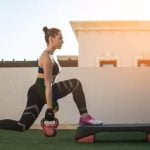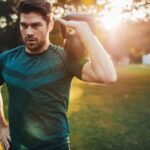In today’s fast-paced world of fitness and health, understanding what to eat before and after a workout is crucial for maximizing your results. Whether you are a casual gym-goer or a seasoned athlete, fueling your body with the right nutrients can make all the difference in your performance and recovery.
Nutrition plays a vital role in providing the energy and essential elements needed to sustain physical activity, enhance muscle growth, and promote overall well-being. Before diving into the specifics of pre and post-workout foods, it is important to recognize the significance of proper fueling for optimal exercise outcomes.
As we delve into the science behind pre-workout nutrition and explore the best post-workout foods, we will uncover how different nutrients such as protein, carbohydrates, healthy fats, and hydration contribute to your fitness journey. By understanding the timing of when to eat before and after a workout, you can fine-tune your nutrition strategy to support your goals effectively.
Stay tuned as we guide you through the essentials of nourishing your body before and after exercise in this comprehensive fitness magazine article.
The Science Behind Pre-Workout Nutrition
Before hitting the gym or starting your workout routine, it’s essential to understand how different nutrients play a crucial role in fueling your body for exercise. Protein, carbohydrates, and healthy fats are key components that can make a significant difference in your performance and overall results. Protein helps repair and build muscle tissues, while carbohydrates provide energy for your workouts. Healthy fats are essential for hormone production and overall cell function.
Proteins are made up of amino acids, which are the building blocks of muscles. Consuming protein before a workout can help prevent muscle breakdown during exercise and promote muscle recovery afterwards. Good sources of pre-workout protein include chicken, lean beef, eggs, or plant-based options like tofu or legumes.
Carbohydrates are the body’s primary source of energy during exercise, providing fuel for both high-intensity workouts and endurance exercises. Opt for complex carbohydrates like whole grains, fruits, and vegetables for sustained energy release. Avoid simple sugars that can cause blood sugar spikes and crashes during your workout.
Healthy fats are necessary for maintaining optimal health and supporting various bodily functions. Incorporate sources of healthy fats such as avocados, nuts, seeds, and olive oil into your pre-workout meal to improve nutrient absorption and sustain energy levels throughout your workout.
| Nutrient | Examples |
|---|---|
| Protein | Chicken, lean beef, eggs |
| Carbohydrates | Whole grains, fruits, vegetables |
| Healthy Fats | Avocados, nuts, seeds |
Understanding how these nutrients work together to fuel your body before a workout is crucial for optimizing your performance and achieving your fitness goals. It’s not only about what you eat but also when you eat it that matters. Make sure to plan your meals or snacks at least 1-2 hours before exercising to allow enough time for digestion without feeling weighed down during your workout.
In addition to focusing on whole foods rich in proteins, complex carbs, and healthy fats before a workout, don’t forget the importance of staying hydrated. Water plays a vital role in regulating body temperature and transporting nutrients throughout the body during physical activity. Dehydration can hinder performance and recovery post-workout. Aim to drink water regularly throughout the day leading up to your workout session to ensure proper hydration levels.
Remember that every individual is unique in their nutritional needs based on their fitness goals, intensity of workouts, and personal preferences. Experiment with different food combinations before working out to find what best fuels your body while keeping you energized throughout the exercise session. Consult with a nutritionist or dietitian if you need personalized advice on optimizing pre-workout nutrition based on your specific needs or restrictions.
Top Pre-Workout Foods
Eating the right types of food before a workout is essential to ensure that your body has the necessary fuel and energy to perform at its best. The combination of protein, complex carbohydrates, and healthy fats can help prepare your muscles for exercise and optimize performance. Here are some examples of top pre-workout foods that you can incorporate into your meal plan:
- Protein: Consuming sources of high-quality protein before a workout can help support muscle repair and growth. Good options include chicken breast, Greek yogurt, eggs, or a protein shake.
- Complex Carbohydrates: Complex carbs are important for sustaining energy levels during a workout. Foods like whole grains (oats, quinoa), fruits (bananas, berries), or sweet potatoes are great choices to fuel your body.
- Healthy Fats: While fats take longer to digest, they provide a long-lasting source of energy. Opt for foods rich in healthy fats such as avocados, nuts, seeds, or nut butter.
By incorporating a balance of these macronutrients into your pre-workout meal or snack, you can enhance your performance and improve your overall fitness routine. Experiment with different combinations to find what works best for your body and provides you with sustained energy throughout your exercise session.
Keep in mind that the timing of your pre-workout meal is also crucial. Aim to eat a balanced meal containing these nutrients approximately 1-2 hours before exercising to allow for proper digestion and absorption. Remember to stay hydrated by drinking water before your workout to prevent dehydration and support optimal performance.
Hydration
Staying hydrated is essential for optimal performance during exercise. Water plays a crucial role in maintaining bodily functions and regulating body temperature, especially when engaging in physical activity. Dehydration can lead to fatigue, dizziness, and decreased exercise performance, emphasizing the importance of hydrating adequately before a workout.
Before starting your workout, it is recommended to drink around 17-20 ounces of water 2-3 hours prior to exercise. This allows your body to absorb the water and ensures that you start your workout session adequately hydrated. Additionally, sipping on another 8 ounces of water 20-30 minutes before exercising can further prevent dehydration during your workout.
Apart from regular water intake, considering the duration and intensity of your workout is crucial in determining how much water you should consume before exercise. Sweating during physical activity leads to fluid loss, highlighting the importance of replenishing those fluids before starting your workout routine. Research shows that even mild dehydration can impair athletic performance, underlining the significance of proper hydration practices what to eat before and after a workout fitness magazine.
| Hydration Before Workout | Recommendation |
|---|---|
| Timing | Drink 17-20 ounces of water 2-3 hours before exercise |
| Additional Intake | Sip on another 8 ounces of water 20-30 minutes prior to working out |
The Best Post-Workout Foods
After a strenuous workout, it is crucial to refuel your body with the right nutrients to aid in recovery and promote muscle growth. Your post-workout meal plays a significant role in replenishing glycogen stores, repairing muscle tissue, and reducing muscle protein breakdown. This section will highlight some of the best post-workout foods to help you maximize your training efforts and achieve your fitness goals.
Protein-Rich Foods
Protein is essential for muscle repair and growth after exercise. Consuming a combination of fast-digesting proteins like whey protein and slow-digesting proteins like casein can help kickstart the recovery process. Good sources of protein include lean meats, poultry, fish, eggs, dairy products, legumes, and plant-based protein powders. A post-workout protein shake or a meal containing lean protein alongside carbohydrates can optimize muscle recovery and promote optimal performance for your next workout.
Carbohydrates
Carbohydrates are vital for replenishing glycogen stores that have been depleted during exercise. Opt for complex carbohydrates like whole grains, fruits, vegetables, and legumes to provide a steady release of energy. Including carbohydrates in your post-workout meal can help restore energy levels and enhance recovery. Avoid highly processed or sugary carbs as they can lead to spikes in blood sugar levels and hinder your progress. Balancing carbs with protein can further improve nutrient uptake and facilitate muscle repair.
Healthy Fats
While protein and carbs often take the spotlight when it comes to post-workout nutrition, don’t overlook the importance of healthy fats in promoting overall health and supporting muscle recovery. Including sources of healthy fats like avocados, nuts, seeds, olive oil, and fatty fish in your post-workout meal can help reduce inflammation, support joint health, and provide sustained energy throughout the day.
Remember that moderation is key when it comes to fats; aim to include a small portion in your post-workout meal to reap the benefits without going overboard on calories.
Timing
When it comes to optimizing your workout performance and results, timing your meals before and after exercise plays a crucial role. Eating the right foods at the right time can provide your body with the necessary nutrients to fuel workouts, enhance recovery, and support muscle growth. So, what should you eat before and after a workout to achieve optimal results?
Before hitting the gym, it’s important to consume a balanced meal that includes a mix of protein, complex carbohydrates, and healthy fats. Ideally, aim to eat a meal 2-3 hours before your workout to allow for proper digestion and energy release during exercise. Foods like oatmeal with nuts and fruit, a turkey sandwich on whole grain bread, or Greek yogurt with berries are great options that provide sustained energy for your training session.
After your workout, replenishing your body with nutrients is essential for recovery and muscle repair. Aim to eat a post-workout meal within 30 minutes to an hour of finishing your exercise session. This meal should include protein to help rebuild muscle tissue, carbohydrates to replenish glycogen stores, and some healthy fats for overall energy balance.
Examples of good post-workout meals include a protein shake with banana, grilled chicken with quinoa and vegetables, or salmon with sweet potato and avocado. Remember that what you eat after working out can significantly impact how effectively your body recovers and progresses towards your fitness goals.
Supplements
Pre-Workout Supplements
Pre-workout supplements are designed to provide a boost in energy, focus, and endurance to maximize the effectiveness of your exercise session. Common ingredients found in pre-workout supplements include caffeine, creatine, beta-alanine, and branched-chain amino acids (BCAAs). Caffeine can improve alertness and reduce perceived exertion during workouts. Creatine is known for increasing strength and muscle mass, while beta-alanine helps delay muscle fatigue. BCAAs are essential for muscle recovery and growth during exercise.
Post-Workout Supplements
Post-workout supplements are essential for replenishing nutrients lost during exercise, promoting muscle recovery, and reducing inflammation. Whey protein is a popular choice for post-workout supplementation as it provides fast-digesting protein necessary for muscle repair and growth. Additionally, consuming carbohydrates after a workout helps replenish glycogen stores in muscles for energy. Other post-workout supplements include glutamine for immune system support and omega-3 fatty acids for reducing inflammation and supporting overall health.
When considering adding supplements to your pre and post-workout nutrition regimen, it is crucial to consult with a healthcare provider or nutritionist to ensure safety, efficacy, and compatibility with your fitness goals. Remember that while supplements can enhance performance when used appropriately, they should not replace whole foods in your diet. Combining proper nutrition with strategic supplement use can help you achieve optimal results in your fitness journey.
Conclusion
In conclusion, it is essential to understand the significance of proper nutrition both before and after a workout in order to fuel your body effectively for exercise. As highlighted in this article, the science behind pre-workout nutrition demonstrates how different nutrients such as protein, complex carbs, and healthy fats play a crucial role in providing energy and supporting muscle function during physical activity.
Hydration also plays a key role in preparing your body for a workout, with water being a fundamental component to ensure optimal performance and prevent dehydration. Additionally, post-workout nutrition is equally important for recovery and muscle repair. Consuming the right nutrients after exercising can help replenish glycogen stores, reduce muscle soreness, and promote overall recovery.
By paying attention to what you eat before and after a workout, as well as considering the timing of your meals or snacks, you can maximize your exercise performance and achieve better results. Remember to include a combination of protein, carbohydrates, healthy fats, and hydration in your pre and post-workout meals to support your fitness goals effectively.
Whether you choose whole foods or supplements to enhance your nutrition intake, finding what works best for your body can ultimately lead to improved athletic performance and overall well-being.
Frequently Asked Questions
What Is Best to Eat Before and After a Workout?
It is important to fuel your body properly before and after a workout. Before a workout, focus on consuming a balance of carbohydrates and protein to provide energy for your exercise session. Some good options include oatmeal with fruit, Greek yogurt with granola, or a banana with almond butter.
What Should I Eat Before a Workout Timeline?
Timing is key when it comes to eating before a workout. Aim to eat a light meal or snack containing carbohydrates and protein around 30 minutes to an hour before you start exercising. This will help provide the necessary energy to power through your workout without feeling overly full or sluggish.
What Are 5 Examples of Foods Are Best for Post Workout?
After a workout, the focus should be on replenishing glycogen stores, repairing muscles, and rehydrating the body. Opt for foods that contain a combination of protein and carbohydrates such as chocolate milk, a turkey sandwich on whole wheat bread, quinoa with roasted vegetables, grilled chicken with sweet potatoes, or a smoothie made with fruits and protein powder.

Passionate about providing useful information to anyone with an interest in the field of Personal Training, I strive to pass on to our readers quality information and to answer any questions about Personal Trainers, the work they do and how to become one.





